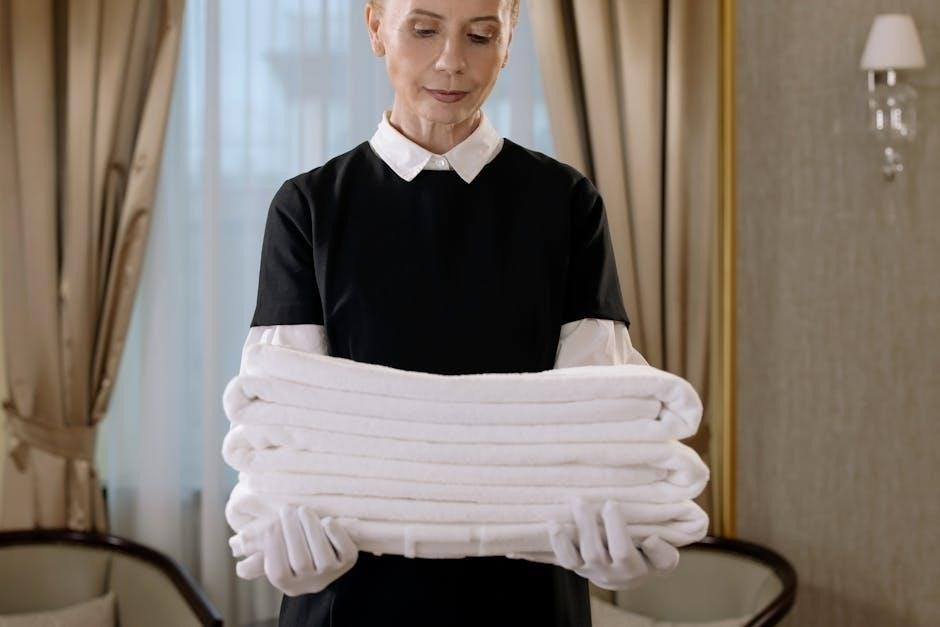
duties and responsibilities of housekeeping staff pdf
Housekeeping staff play a vital role in maintaining cleanliness, hygiene, and aesthetics in hospitality settings. Their duties ensure a pleasant environment for guests and efficient operations.
Key Roles and Responsibilities of Housekeeping Staff
Housekeeping staff are responsible for ensuring cleanliness, hygiene, and safety in guest rooms and public areas. They replenish supplies, maintain aesthetics, and coordinate with front office for efficient service.
1.1 Maintaining Cleanliness and Hygiene in Guest Rooms
Maintaining cleanliness and hygiene in guest rooms is a primary responsibility of housekeeping staff. This includes changing linens, sanitizing bathrooms, and ensuring bedrooms are spotless. Staff must adhere to strict hygiene protocols, using approved cleaning agents and techniques to eliminate germs and odors. They also replenish toiletries, towels, and other amenities to meet guest expectations; Attention to detail is crucial, as guests judge hotel quality by room cleanliness. Regular inspections by supervisors ensure high standards are upheld. Additionally, housekeeping staff must report any maintenance issues to ensure rooms remain safe and functional. Their efforts directly impact guest satisfaction and the hotel’s reputation for quality service.
1.2 Ensuring Proper Maintenance of Public Areas
Ensuring the proper maintenance of public areas is another critical responsibility of housekeeping staff. This includes cleaning and sanitizing lobbies, hallways, staircases, elevators, and restrooms. Staff must dust furniture, polish surfaces, and remove trash to create a welcoming environment. They also clean floors, using techniques such as mopping, sweeping, or buffing, depending on the surface type. Public areas are typically cleaned during low-traffic hours to minimize disruptions. Additionally, housekeeping staff must restock amenities like tissues and soaps in public restrooms and report any maintenance issues to the appropriate departments. Regular inspections are conducted to ensure high standards of cleanliness and safety in these shared spaces.

Daily Tasks of Housekeeping Personnel
Housekeeping personnel perform daily tasks such as cleaning guest rooms, changing linens, replenishing amenities, and organizing supplies to ensure a tidy and comfortable environment for guests.
2.1 Cleaning and Organizing Guest Rooms
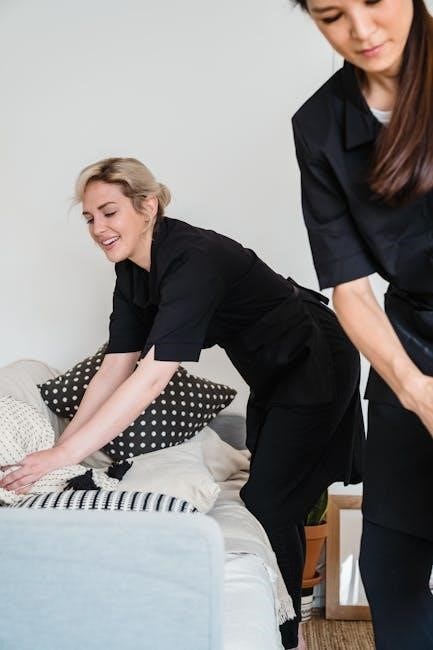
Housekeeping staff are responsible for thoroughly cleaning and organizing guest rooms, ensuring a welcoming and hygienic environment. This includes making beds, changing linens, and replacing towels. They also restock toiletries, refresh towels, and ensure all amenities are replenished. Dusting furniture, vacuuming carpets, and sanitizing bathroom areas are essential tasks. Additionally, they organize guest rooms by arranging furniture, folding clothes, and ensuring everything is tidy. Attention to detail is crucial to maintain high standards of cleanliness and guest satisfaction. Proper organization of rooms helps create a comfortable and inviting space for guests, reflecting the establishment’s commitment to quality service.
2.2 Replenishing Supplies and Amenities
Replenishing supplies and amenities is a critical task for housekeeping staff, ensuring guests have access to essential items. This includes restocking toiletries, towels, and linens, as well as replacing mini-bar items and refreshing water bottles. Housekeeping staff must check each room to identify what needs replenishment and organize supplies neatly. They also ensure that complimentary items, such as tea, coffee, and bottled water, are available. Proper replenishment enhances guest comfort and satisfaction, while also maintaining the establishment’s standards. Effective coordination with other departments, like laundry and procurement, is essential to maintain inventory levels and avoid shortages, ensuring seamless service delivery.
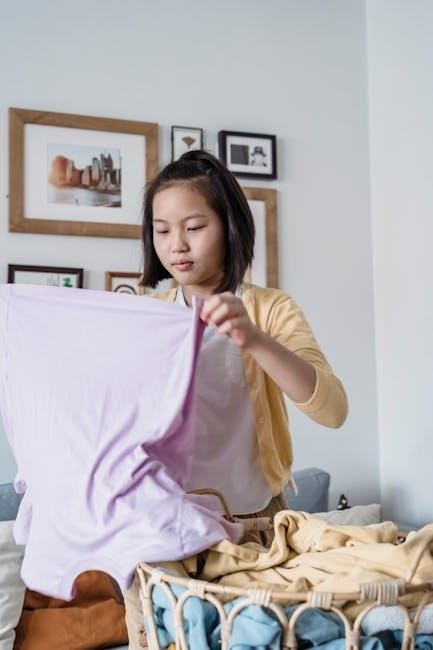
Housekeeping Department Structure
The housekeeping department is hierarchically organized, led by an Executive Housekeeper overseeing supervisors and staff. This structure ensures efficient coordination and maintenance of cleanliness standards across all areas.
3.1 Role of the Executive Housekeeper
The Executive Housekeeper oversees the entire housekeeping department, ensuring high standards of cleanliness and guest satisfaction. They are responsible for planning, budgeting, and supervising staff to maintain efficiency. Key duties include setting quality benchmarks, coordinating with other departments, and addressing guest feedback. The Executive Housekeeper also manages inventory, trains personnel, and implements safety protocols. Their leadership ensures seamless operations, making them crucial to the hotel’s success.
3.2 Responsibilities of Housekeeping Supervisors

Housekeeping Supervisors are responsible for overseeing daily cleaning operations and ensuring staff adherence to quality standards. They coordinate room assignments, monitor progress, and address any issues promptly. Supervisors conduct regular inspections of guest rooms and public areas to maintain high hygiene levels. They also train new staff, manage cleaning supplies, and ensure equipment is in good condition. Additionally, Supervisors handle guest complaints related to housekeeping and escalate unresolved issues to higher management. Their role is crucial for maintaining efficiency, discipline, and guest satisfaction within the department. Effective communication and problem-solving skills are essential for this position.
Specialized Duties in Housekeeping
Specialized duties in housekeeping involve tasks requiring particular expertise, such as laundry management, floor care, and waste disposal, all crucial for maintaining a polished and hygienic environment consistently.
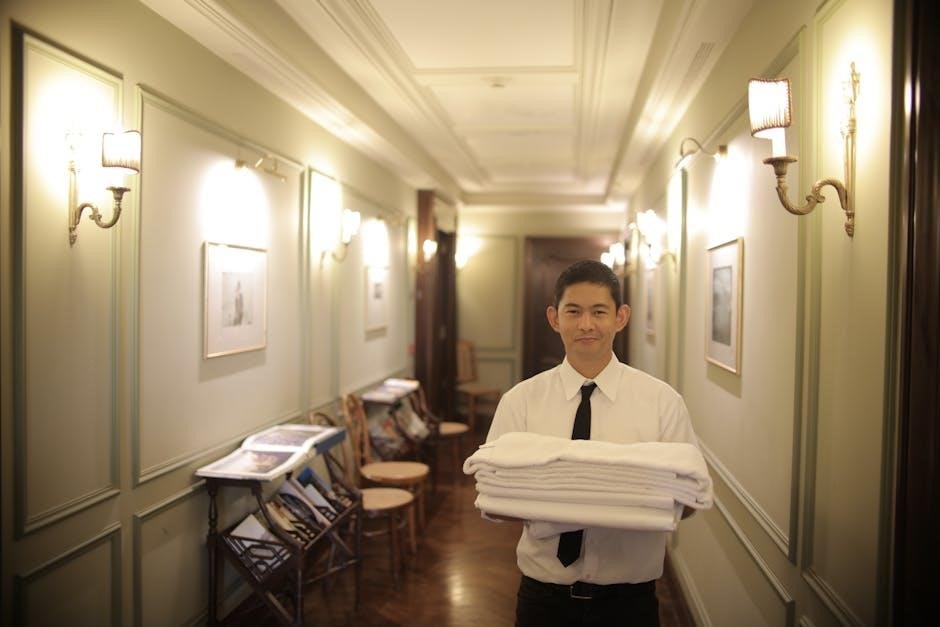
4.1 Laundry and Linen Management
Laundry and linen management are critical tasks in housekeeping, ensuring a constant supply of clean linens and uniforms. Housekeeping staff handle sorting, washing, drying, and folding laundry, adhering to hygiene standards. They monitor linen inventory, restocking as needed to prevent shortages. Additionally, they maintain laundry equipment and report any malfunctions. Proper folding and distribution of linens to guest rooms and public areas are essential. This role ensures the hotel maintains a clean and professional appearance, enhancing guest satisfaction and operational efficiency. Effective management of laundry services is vital for the smooth functioning of the entire establishment. Cleanliness and organization are key priorities in this duty.
4.2 Floor Care and Maintenance
Floor care and maintenance are essential duties for housekeeping staff, ensuring all areas are clean and safe. They sweep, mop, and polish floors regularly, using appropriate cleaning agents. Additionally, staff may strip and wax floors to maintain their appearance. They also address spills promptly to prevent accidents and damage. Monitoring floor conditions and reporting wear or damage are part of their responsibilities. Proper signage is used to alert guests of wet or hazardous areas. This task ensures a clean, safe, and visually appealing environment for both guests and staff, contributing to the overall guest experience and operational efficiency. Attention to detail is crucial in this role.
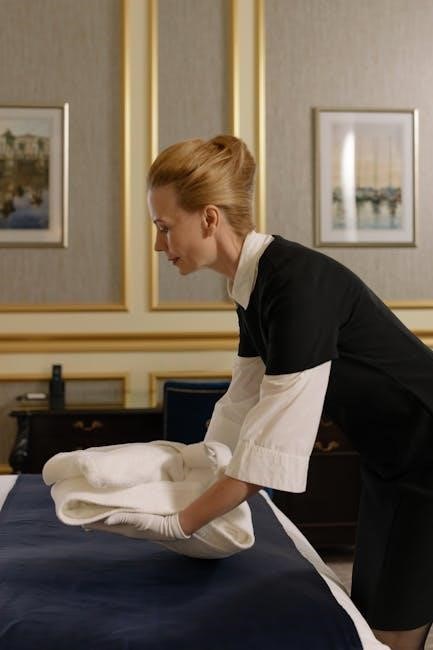
Communication and Coordination in Housekeeping
Communication and coordination are crucial for housekeeping staff to ensure seamless operations. They liaise with front office for room assignments and manage guest complaints promptly and efficiently.
5.1 Liaising with Front Office for Room Assignments
Liaising with the front office is essential for housekeeping staff to receive updates on room assignments, occupancy status, and special requests. This ensures efficient room preparation and allocation. The housekeeping team coordinates with the front desk to prioritize cleaning based on guest arrivals and departures. Effective communication helps in managing room readiness, minimizing delays, and ensuring a smooth guest experience. This collaboration also allows housekeeping to address any specific guest needs promptly, such as extra amenities or early check-ins, enhancing overall service quality and guest satisfaction.
5.2 Handling Guest Complaints and Requests
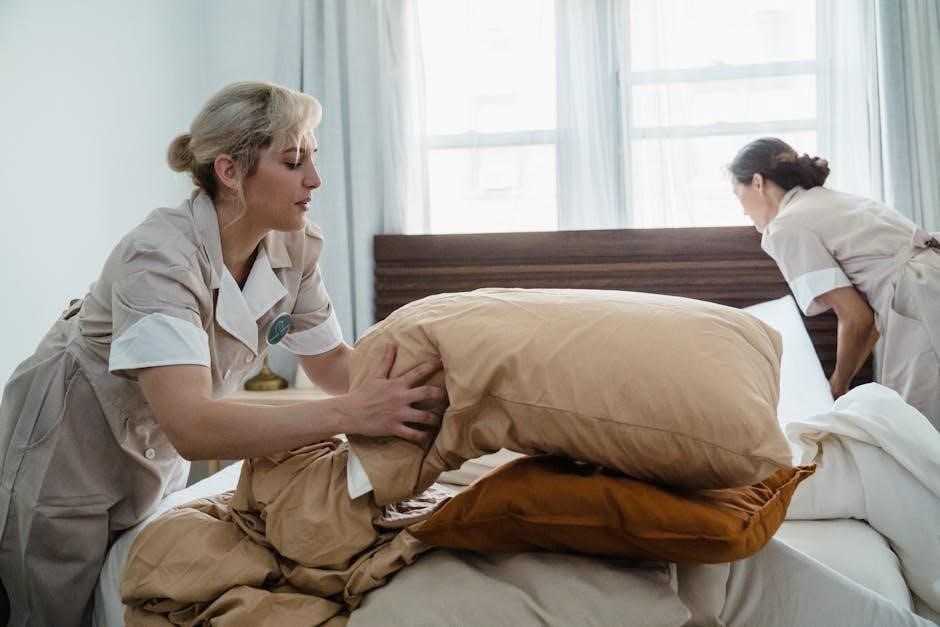
Housekeeping staff are often the first point of contact for guests regarding issues or special requests. Their role involves promptly addressing complaints about room cleanliness, maintenance, or amenities. Effective communication and problem-solving skills are crucial to resolve issues efficiently, ensuring guest satisfaction. Whether it’s providing extra towels, resolving cleanliness concerns, or attending to maintenance needs, housekeeping personnel must act swiftly. They also handle requests for additional services, such as room sprays or extra bedding, ensuring a personalized experience. By maintaining a professional and courteous demeanor, housekeeping staff contribute significantly to enhancing guest comfort and overall stay experience.
Health and Safety Responsibilities
Housekeeping staff must adhere to safety protocols, handle cleaning chemicals properly, and maintain hygiene standards to ensure a safe environment for guests and colleagues.
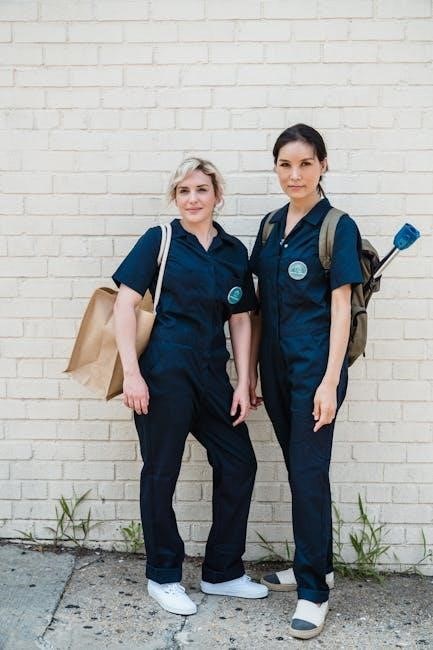
6.1 Ensuring Compliance with Safety Protocols
Housekeeping staff must strictly comply with safety protocols to maintain a secure environment. This includes proper use of cleaning chemicals, wearing PPE, and following emergency procedures. Training is provided to ensure adherence to health and safety regulations, minimizing risks of accidents. Regular inspections are conducted to identify potential hazards, such as slippery floors or improperly stored equipment. Staff are also responsible for reporting incidents or unsafe conditions promptly. Compliance with safety standards protects both guests and employees, ensuring a safe and healthy space. Proper waste disposal and infection control measures are also critical to maintaining hygiene and preventing contamination. These practices are essential for upholding high safety standards in hospitality settings.
6.2 Managing Waste Disposal and Hygiene Practices
Housekeeping staff are responsible for implementing proper waste disposal and hygiene practices. This includes segregating waste into recyclable and non-recyclable categories to minimize environmental impact. They ensure all waste is disposed of in designated areas, adhering to local regulations. Hygiene practices involve sanitizing high-touch areas, such as doorknobs and light switches, to prevent the spread of infections. Proper handwashing techniques and use of disposable gloves are emphasized to maintain cleanliness. Regular training is provided to staff on updated hygiene protocols, ensuring consistency in maintaining a clean and safe environment for guests and employees. These practices are crucial for promoting public health and sustainability in hospitality settings.